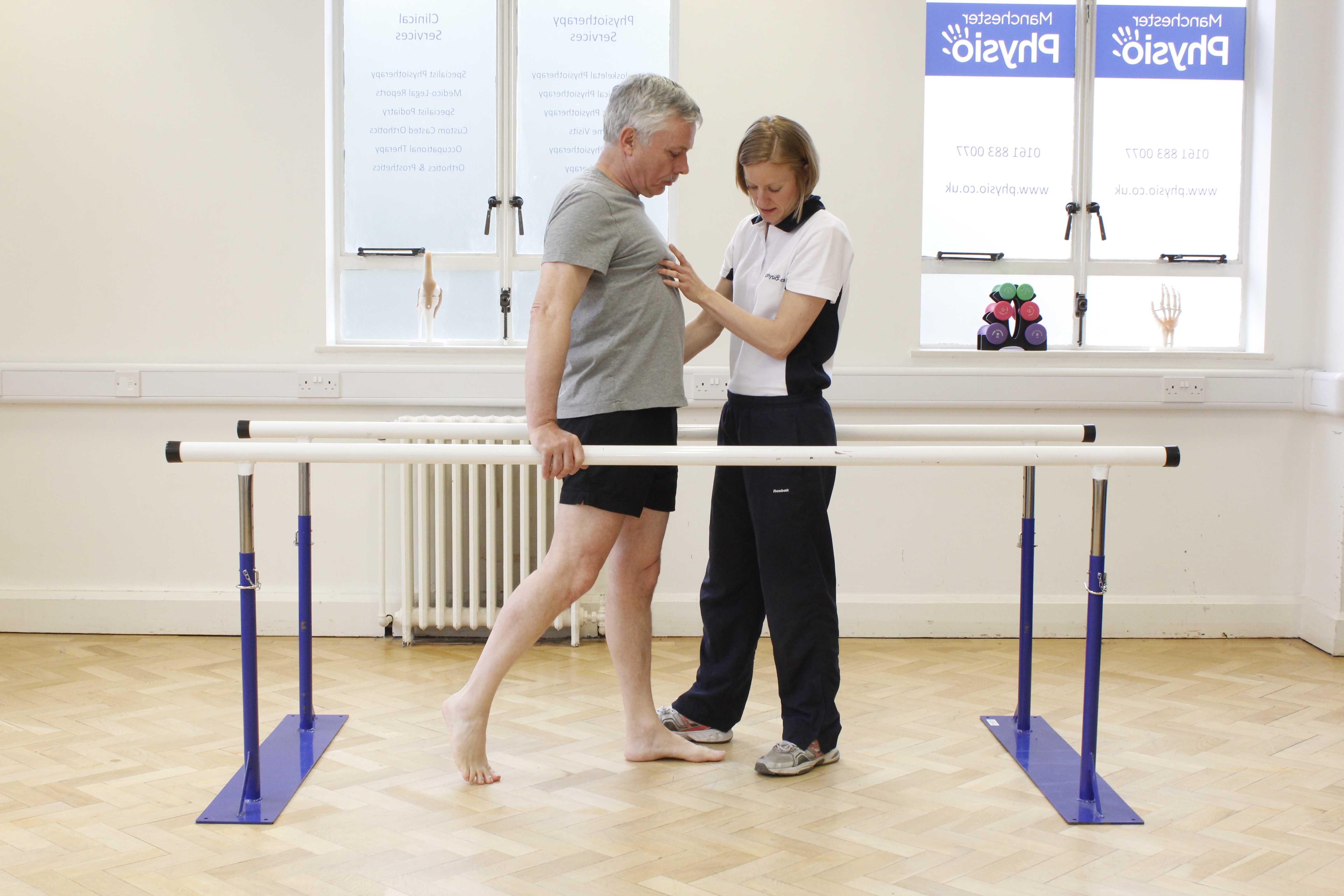What is Chronic Inflammatory Demyelinating Polyneuropathy or CIDP?
Chronic Inflammatory Demyelinating Polyneuropathy (CIDP) is a progressive neurological condition which occurs when the immune system attacks and damages the peripheral nerves causing muscle weakness and impaired sensation in the arms and legs. CIDP is considered to be similar to Guillain-Barre syndrome but more can last for a longer period of time.
Even though CIPD is a chronic condition, physiotherapy treatment will maximise your potential with normal activities by increasing muscle strength and minimising muscle wasting.
 Above: Specialist physiotherapist supervising mobilisation exercises between the parallel bars
Above: Specialist physiotherapist supervising mobilisation exercises between the parallel barsWhat causes CIDP?
CIPD is an autoimmune disease which means the immune system attacks the myelin sheath (layer surrounding nerve) because it thinks it is a foreign body. As with Guillain-Barré syndrome, CIDP may be triggered by a recent viral infection.However, it is still unclear why the immune system does this. CIPD is associated with:
- HIV
- Hodgkin lymphoma
- Inflammatory bowel disease
- Systemic lupus erythematosus (SLE)
- Active hepatitis
Diagnosis of CIDP
Diagnosing CIDP will be confirmed by a neurologist who will look at your history and current symptoms. Electrophysiological tests such as an Electromyography (EMG) and Nerve Conduction Velocity (NCV) may also be conducted to confirm a diagnosis.
What are the effects/symptoms of CIPD?
The symptoms of CIPD can vary from person to person but may include:
- Abnormal sensation such as tingling or numbness often in the toes and fingers
- Muscle weakness of the arms and legs – leg weakness can result in clumsy gait, and tripping on uneven ground. Hand and forearm weakness can result in difficult writing, fastening buttons, and brushing hair
- Loss of deep tendon reflexes (such as the knee jerk reflex)
- Fatigue
Physiotherapy for CIPD
At Physio.co.uk, we have specialised physiotherapists who are experienced at treating patients with chronic neurological conditions. Our motivated physiotherapists provide individualised treatment to help maximise your physical potential so that you can continue with daily activities as independently as possible.
Your physiotherapist at Physio.co.uk will play an important role in supporting you throughout your treatment to help manage your symptoms and improve your quality of life. An initial assessment will look at how your current symptoms are affecting your everyday life and a rehabilitation programme will be developed ensuring that you needs are at the centre of the treatment.
Physiotherapy treatment will focus on:
- Maximising muscle strength
- Minimising muscle wasting
- Maintain full range of movement at joints
- Increasing fitness and energy levels
- Improving posture when lying, sitting or standing
- Improving mobility
- Minimising secondary complications such as muscle contractures and chest infections
- Strengthening exercises teaching you how to use your muscles correctly and as often as possible
- Stretching to minimise the development stiffness around joints
- Exercises to facilitate mobility and everyday tasks
- Breathing control and assisted coughing if appropriate to maintain a clear chest
- Advice on orthotics or splints to stretch tight muscles or support the foot when standing and walking
- Advice about equipment to help with mobility, such as walking frames and wheelchairs
- Hydrotherapy treatment to strengthen and stretch muscles

 0330 088 7800
0330 088 7800


































